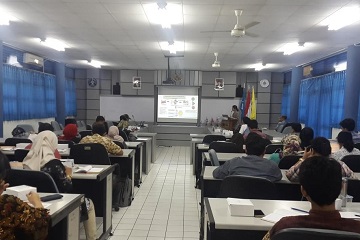Seaweed Expert Discussion at IPB

Indonesia is one of the countries that has become a hotspot for world marine biodiversity, including seaweed or algae. Even Indonesia is one of the largest producers of seaweed in the world. Among the seaweeds that are widely cultivated in Indonesian marine waters are Gracilaria sp and Kappaphycus cottonii (Eucheuma cottonii), each of which is a source of carrageenan. Hydrocolloid polysaccharides are widely used in the food, pharmaceutical and other industries, including gelling agents and emulsifiers.
Besides the two types of algae above, there are still many types of seaweed that can be found in our marine waters. Aside from being a source of hydrocolloids, algae are also a source of active components with various biological activities, including as antimicrobial, antiviral, antioxidant and so on. There are still a lot of potential seaweed that has not been explored. Therefore, the Department of Aquatic Products Technology, Faculty of Fisheries and Marine Sciences, Bogor Agricultural University (FPIK-IPB) in collaboration with the Center for Coastal and Ocean Resources Studies (PKSPL), Institute for Research and Community Service (LPPM) held an International Workshop with the theme "Biodiversity and Metabolomics of Tropical Seaweeds". This activity was attended by students and researchers from various institutions and universities.
The workshop on the diversity and metabolomics of tropical seaweed was held on August 21, 2018. This activity was opened by the Deputy Dean of Academic and Student Affairs of FPIK IPB who was also one of the seaweed experts from IPB, Prof. Joko Santoso.
The speakers at this workshop were Prof. Georg Pohnert from Jena University Germany, Prof. Yumiko Yoshie-Stark from Tokyo University Japan, as well as lecturers from FPIK IPB namely Prof. Joko Santoso, from the Department of Aquatic Product Technology IPB, Dr. Irzal Effendi a researcher from the Department of Aquaculture of IPB and the Center for Study of Coastal and Ocean Resources (PKSPL) of IPB, and Dr. Hawis Madduppa a researcher from the Department of Marine Science and Technology of IPB and PKSPL of LPPM IPB.
Dr. Irzal Effendi delivered developments on seaweed cultivation in Indonesia. Dr. Hawis Madduppa explains the genetic diversity of tropical seaweed, especially from Indonesia. Prof. Yumiko Yoshie-Stark and Prof. Joko Santoso conveyed the potential of the active component in seaweed and its application for food and health. Prof. Georg Pohnert, one of the world's seaweed experts delivered a study of metabolomics of marine algae which he had carried out for more than 30 years.
This activity is expected to provide broader insight into the diversity and potential utilization of marine algae to students and researchers, especially those who are observers of seaweed in Indonesia. In the future, we can utilize the great potential of seaweed in a sustainable manner. (FM)


